Nearly 21 decades later, it is impossible to know what really triggered the attack on the Quicks that day. Was it just that the gulf between the Lenape and the white settlers had grown so great that it allowed hatred and murderous rage to fester? Was it some personal grudge the Indians held toward the Quicks? Some historians now believe that it may have simply been a random act of war, a consequence of the plots and ploys set in motion thousands of miles away by the Great Powers in Europe.
In fact, some historians, including Streleicki, who openly question whether the attackers were Lenape at all. Perhaps, she said, they were part of a war party from one of the French-allied Indian nations scouting the easternmost edge of the theater of war. Maybe they had some Lenape with them, perhaps even Muskwink. But that is not certain.
What is clear is that the attack happened, and that it sparked in Tom Quick Jr. a lifelong thirst for bloody revenge.
Some men thrill in the act of killing and revel in the act of hunting people, taking pleasure in the pain and death of another. These people find a way to dehumanize their prey. But it is sometimes hard to distinguish the ravenous killer from the heroes under arms who kill because they have to, for God, for country or for survival.
Shakespeare put it this way: "In peace, there's nothing so becomes a man as modest stillness and humility, but when the blasts of war blow in our ears, summon up the blood, stiffen the sinews and imitate the actions of the tiger."
In hindsight, perhaps, it is easier to see which of the two categories Quick fell into.
By all accounts, the personal war he launched was motivated only by a desire for revenge. And unlike those soldiers who put down their arms after the French and Indian War ended, Quick continued his private bid to extirpate the Indians from the region.
Though he would later be described by fabulists churning out frontier myths, there is no evidence to suggest that Quick was driven by a desire to protect fellow settlers who had followed his father to the woodlands that stretched between Shohola and Milford, east across the river to the area around present day Netcong, N.J. He wanted blood.
 |
| Tom Quick |
But there is also evidence to suggest that for whatever reasons, the settlers seemed to have embraced Tom Quick. After the war, when the British colonial authorities began to see the wisdom of trying to mollify the Indians under their jurisdiction, they began to crack down on freelance belligerents who attacked Indians. And while there is no evidence that the authorities ever specifically targeted Quick, there is ample evidence that the settlers, who would later gild Quick's actions with a veneer of unwarranted heroism, would sometimes feed him, and give him a place to stay just in case the authorities were looking for him.
Perhaps they did see Quick as their protector, or perhaps they were more afraid of the volatile and erratic woodsman than they were of the authorities. If they had any queasiness about Quick's excesses, however, they certainly excised them from his legend.



